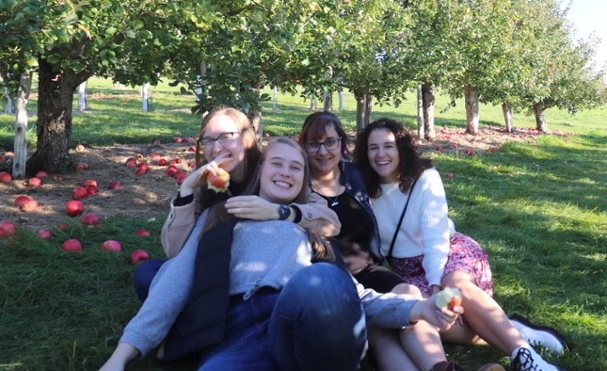Can we really make packaging out of squished apples?
Author: PomPak
Posted on Feb 3, 2022
Category: Programs and Updates
The story of PomPak - UNB Sustainability's winner for the Apex Business Plan Competition 2022

In the summer of 2021, four chemical engineering students came together to start brainstorming what we wanted to do for our senior design project. We knew it would be a huge part of the next eight months of our lives, so we wanted to pick a topic that inspired us, a topic we were excited about. We knew we wanted to do something in the sustainability sector, and we were really excited about exploring the agricultural industry, in particular the apple industry. We were also enthusiastic about the idea of developing a sustainable upgrade for the alcoholic beverages, which has historically been one of the most enduring industries. This led us in a clear direction: alcoholic apple cider.
In our excitement, we began to research the apple cider industry to learn everything we could about the process. Through this research, we were able to find some of the biggest opportunities for sustainable upgrades: packaging, and repurposed waste. Alcohol packaging has always been a major source of waste, and with at-home consumption increasing during the pandemic, people are drinking more from cans and less from taps at restaurants and bars, increasing the amount of waste generated. Cans are a more popular packaging option compared to bottles, and the current popular methods of packaging cans include soft plastic rings famous for their role in damaging aquatic life or hard plastic recyclable can toppers. Biodegradable can toppers do exist, however, these are made of cyclical crops grown explicitly for this purpose. There are also functional issues with these toppers, including trouble loading and unloading the cans.
Another opportunity for a sustainable upgrade we noticed was in the waste generated from juice pressing. After apples are pressed for their juice, 1/3 remains behind as a pulpy residue known as pomace. Currently, this waste is left to decompose on-site at most pressing orchards, where it emits methane into the atmosphere. Unfortunately, it serves little purpose in the agriculture industry currently, as it is too acidic for use as feed or fertilizer. But that doesn’t mean it can’t be used for anything.
We began to investigate the properties of apple pomace and noticed a striking similarity in the chemical composition to another familiar material: wood chips. Knowing that wood chips are a common source material used to manufacture molded pulp products like egg cartons, an idea began to form. What if we replaced wood chips with apple pomace, and made biodegradable can toppers out of the waste left over from apple pressing? How cool would it be to package apple cider in apples?
Without wasting time, we started reaching out to local apple pressers in the Fredericton area, along with contacts in the engineering department who could help us put our idea into practice. We were thrilled by the amount of support from our contacts, and we’re thrilled with how far our idea has come. Hopefully some day soon you’ll be able to buy a local Fredericton cider packaged in the excess apples that it came from!